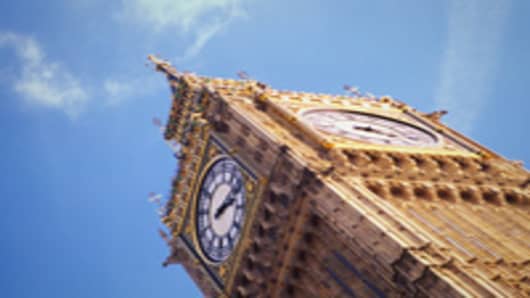The British economy shrank by 0.2 percent in the final quarter of 2011, taking the annual growth figure for 2011 down to 0.8 percent, official figures published on Wednesday showed, adding to fears the economy is falling into a double - dip recession.
The figures from the Office of National Statistics (ONS) were slightly worse than expectations, with Reuters forecasting a contraction of 0.1 percent, and paint a gloomy picture for the economy at the start of 2012 as austerity measures implemented by the coalition government and the perilous state of the euro zone continue to create pressure.
The ONS said output of the production industries decreased by 1.2 percent in the fourth quarter 2011, compared with an increase of 0.2 percent in the previous quarter. The statistical agency pointed to the public services strike on 30 November as one of the reasons for the decline in output.
Information from the ONS's Labour Disputes Inquiry, published on 18 January, suggested nearly one million working days were lost, representing about 0.2 percent of the total number of working days for the public sector for the quarter the ONS added.
UK Chancellor George Osborne responded to the figures admitting he found them “disappointing” although he added they were not entirely unexpected given the state of the global economy and continuing crisis in the euro zone.
“Now, Britain has substantial economic problems, and debts built up over the last ten years. We’re dealing with those, but the truth is, dealing with those problems is made more difficult by the situation in the euro zone, and clearly what’s happening at home is also affected by what’s happening abroad, " he said.
But the chancellor of the exchequer insisted the government’s policy of public spending cuts was still the right course for Britain’s economy.
“Britain has substantial debts, and if we don’t deal with those debts, our economic problems will be substantially worse. And what we were reminded of this week is that the rest of the world is also facing real economic problems, and countries that aren’t dealing convincingly with their debts face worse economic prospects than we do,” he said. “So I think we’ve got the right plan; we’ve got to stick to it; but we’ve got to accept that Britain’s economic problems, difficult as they are, built up as they have been over the last ten years, have been made worse by the situation in the euro zone, by the crisis on our doorstep.”
The figures come a day after the International Monetary Fund( IMF) warned the global economy would only grow by 3.3 percent this yearand that the euro zone would fall into recession with the single currency's economy now forecast to contract by 0.5 percent in 2012 versus a previous estimate that it would grow by 1.1 percent.
The IMF revised down its growth forecast for all major economies including the UK which it said would grow by 0.6 percent this year revised down from 1.6 percent in an earlier forecast published in October. The figure was slightly lower than the 0.7 percent forecast by the coalition government's own economic forecaster the Office for Budget Responsibility (OBR).
However, it was not quite so gloomy at the forecast published by the Ernst & Young Item Club a week ago which suggested the UK economy was already probably in the grip of a technical recessionand would struggle to reach positive growth until 2013. The Item Club predicted the UK economy would grow by no more than 0.2 percent in 2012.
“The IMF has downgraded its growth forecasts for all the major economies, reflecting the deterioration in the global outlook since their last forecasts in September," a Treasury spokesman said in a statement.
"Their expectations for UK growth are in line with those of the Office of Budgetary Responsibility, and stronger than for the other major European economies."


